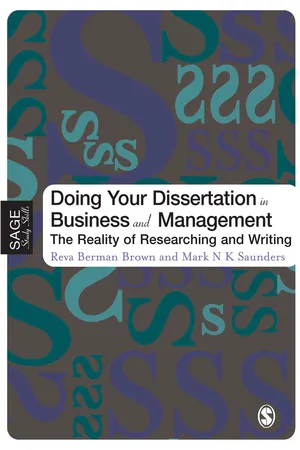
Doing Your Dissertation in Business and Management
The Reality of Researching and Writing
- 128 pages
- English
- ePUB (mobile friendly)
- Available on iOS & Android
Doing Your Dissertation in Business and Management
The Reality of Researching and Writing
About This Book
This is a research book with a difference. It tells the truth about the research process. Each phase of a research project is addressed in the simultaneous order in which researchers often undertake them. Importantly, the book recognizes that writing up a research project is rarely organized in the form in which the dissertation is finally presented.
Readers are given guidelines to help them assess the kind of researcher they are and the all important question of how to chose a research project is answered. The book is easy to read and covers:
- An explanation of what lies behind the requirements that need to be met by a research proposal
- What readers should expect from their supervisors and what the researched organisation might expect from readers
- Support for the confused and anxious student.
This book will guide the student through a challenging time, giving quick and realistic support to enable a stress-free completion of their final dissertation and project write up.
SAGE Study Skills are essential study guides for students of all levels. From how to write great essays and succeeding at university, to writing your undergraduate dissertation and doing postgraduate research, SAGE Study Skills help you get the best from your time at university. Visit the SAGE Study Skills hub for tips, resources and videos on study success!
Frequently asked questions
Information
1 | What’s in this for you? |
Why the book was written
- deals in more detail with the issues of finding the topic than is often provided in research methods books
- explains what is behind the requirements involved in creating the research proposal
- gives advice on the actual process of writing
- is a practical, down-to-earth user’s manual intended to tell it how it is, not how it should be.
What the book will achieve for your supervisors
- save them hours of repeating themselves in giving advice and encouragement when students come individually with the same problems and difficulties
- help them to be better supervisors – in writing the book, I have made explicit a number of items which supervisors sometimes take for granted because ‘surely everybody knows that?’, when everybody doesn’t necessarily know it
- provide them with the satisfaction that comes from knowing that they have been able to provide advice and assistance to more students than those they currently teach.
What the book will achieve for you
- help you to find the topic that you intend to research
- explain why you need to create the research proposal, so you understand why you are often made to do one
- support you through the confusion and anxiety that is a normal companion to undertaking research
- explain why you need to write your dissertation in a style that is often difficult to use
- advise you on the actual process of writing
- tell you how research for your dissertation is actually done, not how it should be done
- enable you to become a member of the community of researchers into management and organisations by introducing you to the real, as opposed to the ideal, world of research.
What the book does not do
- present research as a linear, systematic, totally rational process that, once planned, can be conducted in a smooth, coherent flow, with no hitches, accidents or obstacles
- use ‘academic-speak’
- repeat what is well-covered in current research methods textbooks such as detailed explanations of methods of data collection or data analysis
- explain the conventions or technicalities of referencing
- suggest learning outcomes
- solve all your researching problems
- replace the need to use your research methods textbook
- give lists of all the other books, papers and articles you should refer to as well as reading this one.
How to use the book
Something to bear in mind
Table of contents
- Cover Page
- Title Page
- Copyright Page
- Contents
- 1 What’s in this for you?
- 2 Before you begin to begin
- 3 On the edge of beginning
- 4 The problem with the research problem
- 5 The problem with the research process
- 6 Time well spent: the research design
- 7 What they said about your topic: the literature search and review
- 8 Getting your information and dealing with it
- 9 Writing matters
- 10 The final effort
- Appendix 1 How to read a business/management academic paper
- Appendix 2 Don’t forget your ethics
- Appendix 3 Let’s have an argument